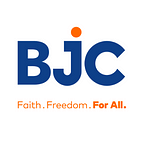Reflection on the Voices of Asian American Faith Freedom Conversations
By Richard Chung
During the month of May, Charles Watson, Jr., the director of education at BJC, held three conversations with Asian American faith leaders in honor of AAPI Heritage Month. Rev. Lauren Ng, Dr. Khyati Joshi, and Tahil Sharma shared their thoughts about how their Asian American identity shapes their own faith as well as their insights about faith freedom and religious liberty from an Asian American perspective. As each guest speaker shared about their family’s religious history and their own religious upbringing, I couldn’t help but reflect on my own.
Every Sunday from when I was a toddler until I left home for college, my mom, my younger brother, and I attended Young Nak Church, one of the largest Korean American churches in Los Angeles. My mom and the church worked together to teach me and my brother what it meant to be a Christian and how to follow Christ: they taught us how to pray, how to read the Bible, and how to enjoy fellowship with other believers. Less apparent to me at the time was the fact that the church also helped shape my Korean American identity, whether it was through the Korean language classes I attended for several years after service or the weekend retreats where we would play Korean games and eat spicy instant ramen late at night. It was one of the few spaces in my life that was made by and made for Korean Americans.
My experience is by no means unique. Religious communities are important for all Americans, but they play an especially important role for immigrants. They provide a social and financial support network in an unfamiliar land, and they pass on not just religious practices and beliefs, but often also the culture and language of the older generation to those who were born in the U.S. While I knew from my own experience that these communities are a source of beauty and strength to the immigrants they serve, I was challenged and inspired by the speakers to also believe that these communities, in all their religious and ethnic diversity, can be — and already are — valuable to all Americans.
I am grateful that our constitution guarantees freedom of worship and religious toleration for all Americans and this legal protection is not one to be taken for granted. However, the speakers presented a more full and vibrant vision of religious liberty, one in which these religious communities are not merely tolerated, but seen as positive contributors to American social, cultural, and religious life, and communities that all Americans can learn from.
As all of the speakers emphasized, Asian Americans and Asian American faiths are not monolithic, which means that we have an incredibly diverse array of religious traditions, experiences, and perspectives to offer to those who are willing to be open to them. Likewise, I hope that Asian American faith communities can appreciate and celebrate the diversity that surrounds them while not feeling pressure to erase their unique cultural and religious heritages.
I am grateful to BJC for shining a spotlight on Asian American voices, which can often be overlooked. I hope this series motivates us to not only fight for the religious liberty of all, but also inspires us to celebrate and even learn from those who are different from us.
Richard Chung graduated from New York University School of Law with a J.D. in the spring of 2020 and currently serves as a law clerk on the Massachusetts Appeals Court. Richard was a 2017 spring BJC intern.
